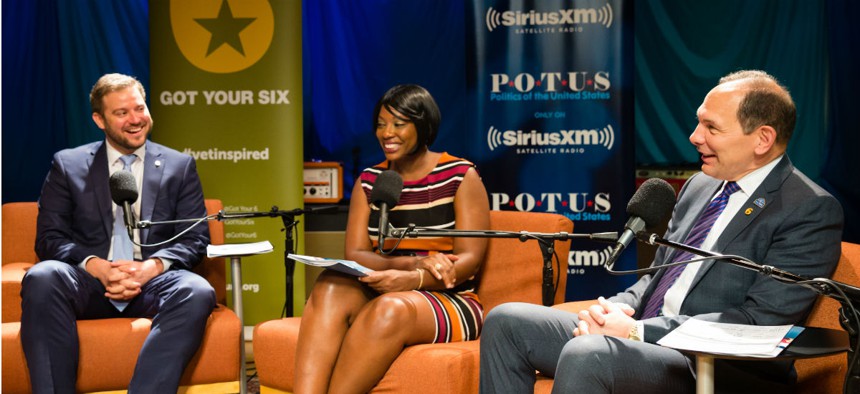
Bill Rausch, of Got Your 6, Janaia DeShields, at Points of Light and VA Secretary Bob McDonald discuss veterans issues. Matt Mabe/Got Your 6
Vets Are More Civically Engaged Than The Rest of Us, Research Finds
Report shows that those who served are more likely than non-veterans to volunteer, vote, and actively participate in their communities.
Veterans are more likely than non-vets to volunteer, vote and actively participate in their communities, according to a new report based on government data.
The 2016 Veterans Civic Health Index found that 74 percent of vets vote in local elections compared to 57 percent of non-vets, and volunteer an average of 169 hours per year – 43 hours more than those who haven’t served in the military. Vets are also more likely to give to charity, contact public officials, attend public meetings and work with their neighbors to solve problems in their communities, concluded the study released by Got Your 6, a national campaign that aims to dispel myths about vets and empower them to lead in local communities.
The group unveiled the report, which is based on 2014 census data, during a Sept. 29 event at the SiriusXM Radio studios in Washington, D.C.
High levels of civic engagement among veterans put them in a strong position to effect positive change in communities and help tackle some of the country’s most pressing problems, said event participants.
For instance, many law enforcement officers have served in the military, and various leaders within the Black Lives Matter movement are veterans. “Our veterans are going to be the leaders in those communities to change what’s happening with race relations, the different concerns with our police and our citizens,” said Army vet Janaia DeShields, vice president of veteran and military programs at Points of Light. “I believe that our veterans are going to be the ones that serve as the mediator, the facilitator, to help tie the two and bring the two together.”
The fact that the veteran population is increasingly diverse, and craves civic engagement in their post-military lives, is proof that the stereotype of vets as just victims or heroes is false – and dangerous, said Bill Rausch, executive director of Got Your 6.
“Our mission is to encourage vets to lead a resurgence across communities in America,” Rausch said during one of the event’s panel discussions. The country has to “stop thinking about veterans as a special interest group” that always needs something, he added. “Employ us because we’re going to make your business better. Engage us, because then we’re going to volunteer at a local non-profit,” said the Army vet. “We’re not saying that we don’t have problems. We’ve experienced trauma, loss, unemployment. But all Americans have experienced those things, and that’s a common bond that we have.”
The Veterans Civic Health Index, which is the second such report, said that vets’ desire to seek out a higher purpose after their military service benefits communities as well as the individual.
“For veterans, community involvement is a critical component of successful reintegration,” stated the report, written by Julia Tivald, director of strategy at Got Your 6. “Transitioning out of the military is a significant life event that can alter veterans’ sense of purpose and social connectedness. Community involvement allows for the development of authentic connections and relationships during this time of transition and throughout one’s life.”
Community-driven solutions to public policy issues also have to be part of the equation when it comes to managing an effective Veterans Affairs Department, said VA Secretary Bob McDonald, who also spoke at the event. “We can make policy from D.C., but the customization, the service, has to occur at the local level,” McDonald said.
McDonald, an Army vet and former head of Procter and Gamble, has led a major management transformation at VA since he got to the department in 2014, a few months after the wait-times scandal erupted. When asked during the Got Your 6 event whether he would stay on as VA secretary during the next administration, McDonald didn’t rule it out. “It’s up to the president of the United States,” he said. “I’d have to discuss it with my family, obviously.”
Got Your 6 partnered with the National Conference on Citizenship, Harry and Jeanette Weinberg Foundation, and American Express on the 2016 Veterans Civic Health Index.
NEXT STORY: Can a New Work Design Help the Government?







